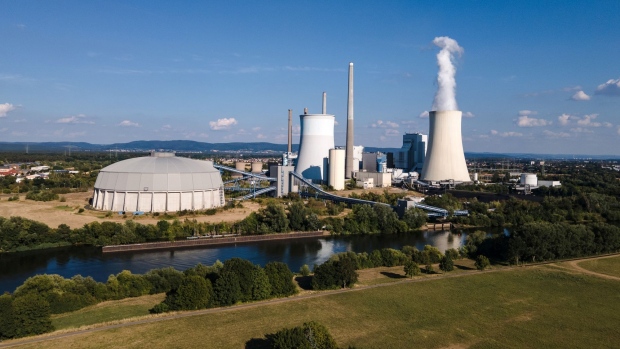Aug 23, 2022
European Gas Jumps on Concerns of Winter Supply Shortages
, Bloomberg News

(Bloomberg) -- European natural gas prices are taking a breather amid further signs that soaring energy costs are crippling economic output, heaping pressure on politicians to resolve the crisis with winter just a few months away.
Benchmark futures retreated after settling at a record high on Monday. Prices are still about six times higher than they were at this time last year, with the panic spreading across nations ahead of peak winter demand.
Russia’s Gazprom PJSC will halt flows on the key Nord Stream pipeline to Germany for three days of maintenance starting Aug. 31, raising concerns the link may not return after the work. Lower flows would jeopardize Europe’s efforts to fill storage sites to prepare for the colder months.
The instability has shocked global markets, sending gas prices from Asia to the US soaring amid a race for supplies. In Europe, a prolonged cut in Nord Stream shipments would exacerbate a crisis that has dragged on for months -- stoking inflation, curtailing industrial production an fanning the risk of recession. The euro is now trading near a two-decade low against the dollar.
Read also: US Natural Gas Futures Hit $10 for First Time Since 2008
Dutch front-month futures, the European benchmark, settled 2.8% lower at 269.05 euros per megawatt-hour, while the UK equivalent declined 6.1%, with some traders taking profits after the recent rally. German year-ahead power prices slipped 2.9%, after surging to a fresh record.
Read also: European Power Costs So Much It’s Now Equal to $1,000 Oil: Chart
Gas prices could rise to 400 euros per megawatt-hour if flows via Nord Stream stop in September, according to Leon Izbicki, a gas analyst at Energy Aspects Ltd. “Current prices have a significant impact on industrial gas demand in Europe, with our models indicating a yearly reduction in Western European industrial gas demand of 15% in 2022.”
The list of industries that are curbing output is growing. Poland’s biggest chemicals company, Grupa Azoty SA, has stopped making some of its key products and trimmed production of ammonia because of record gas prices, it said in a statement on Tuesday.
In France, new orders declined this month in both services and manufacturing. French output is contracting for the first time in a year and a half, mirroring the trend seen in Germany as Europe’s biggest economies succumb to record inflation and increasing uncertainty. A recession in the 19-member euro zone is now more likely than not, according to analysts surveyed by Bloomberg.
Pressure on Politicians
“For most major euro-zone countries, the terms of trade shock from higher gas prices this year will be bigger than both the 1974 and 1979 oil shocks,” Capital Economics said in a note.
Germany, which is highly dependent on Russian gas to power its factories and household heaters, is particularly exposed to the crisis. The country’s authorities have been trying to seal deals to tap alternative energy sources, and have voiced concerns about the need for rationing during the coldest months of the year.
Meanwhile, Chancellor Olaf Scholz’s popularity is sagging after six months in office, with pressure mounting for him to quell soaring inflation.
In a trip to Canada, Scholz on Monday said Russia is no longer a reliable business partner and emphasized the need to increase imports of liquefied natural gas. However, Europe competes for LNG with Asia, where countries are rushing to get more shipments through the end of the year.
Read more: Asia LNG Prices Rally to Five-Month High on Global Rush for Gas
While there is no relief in sight for supply, European demand remains abnormally high for the summer. Hot and dry weather has led to high air-conditioning use, and low hydro and nuclear output as European rivers dry up.
©2022 Bloomberg L.P.





